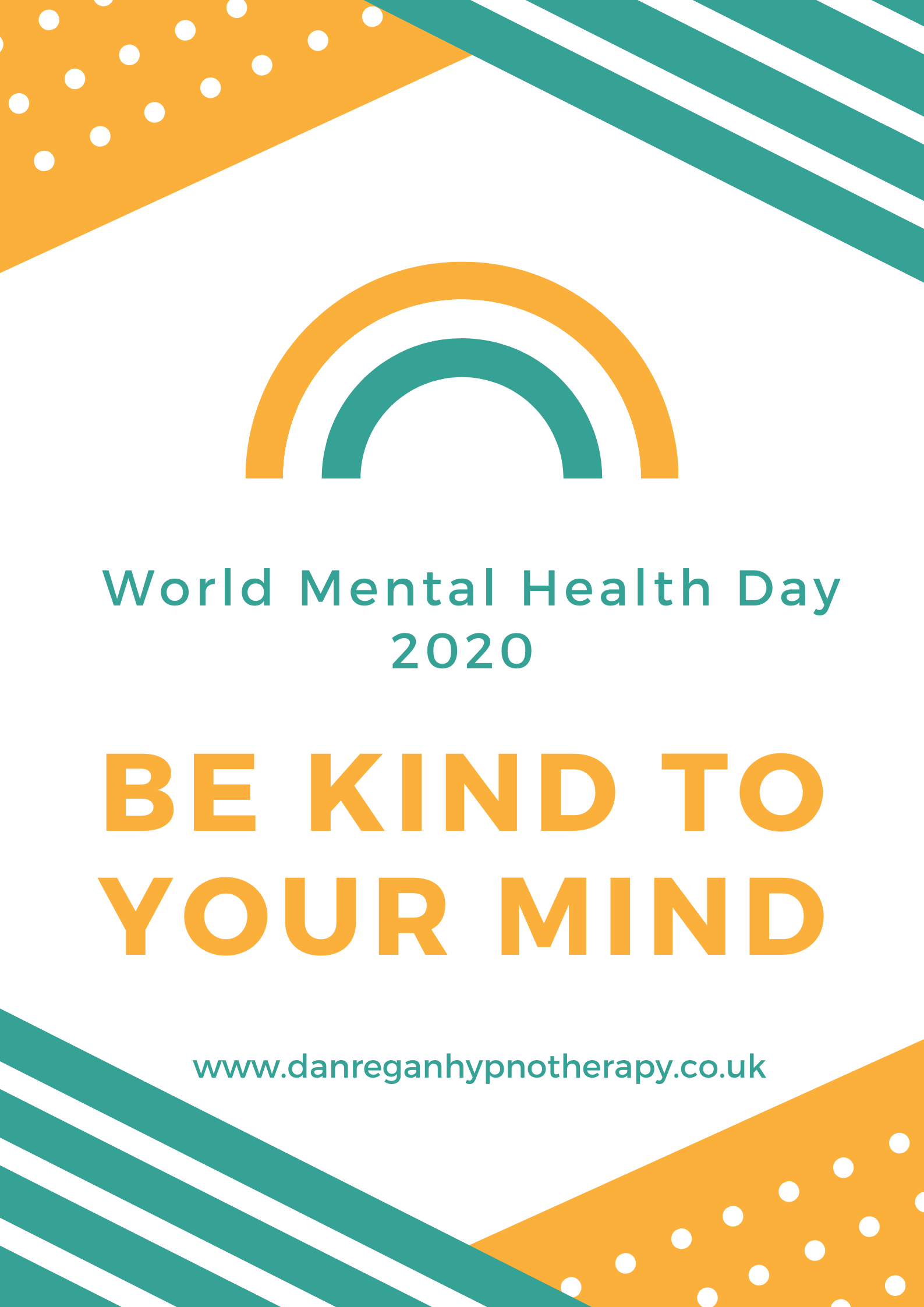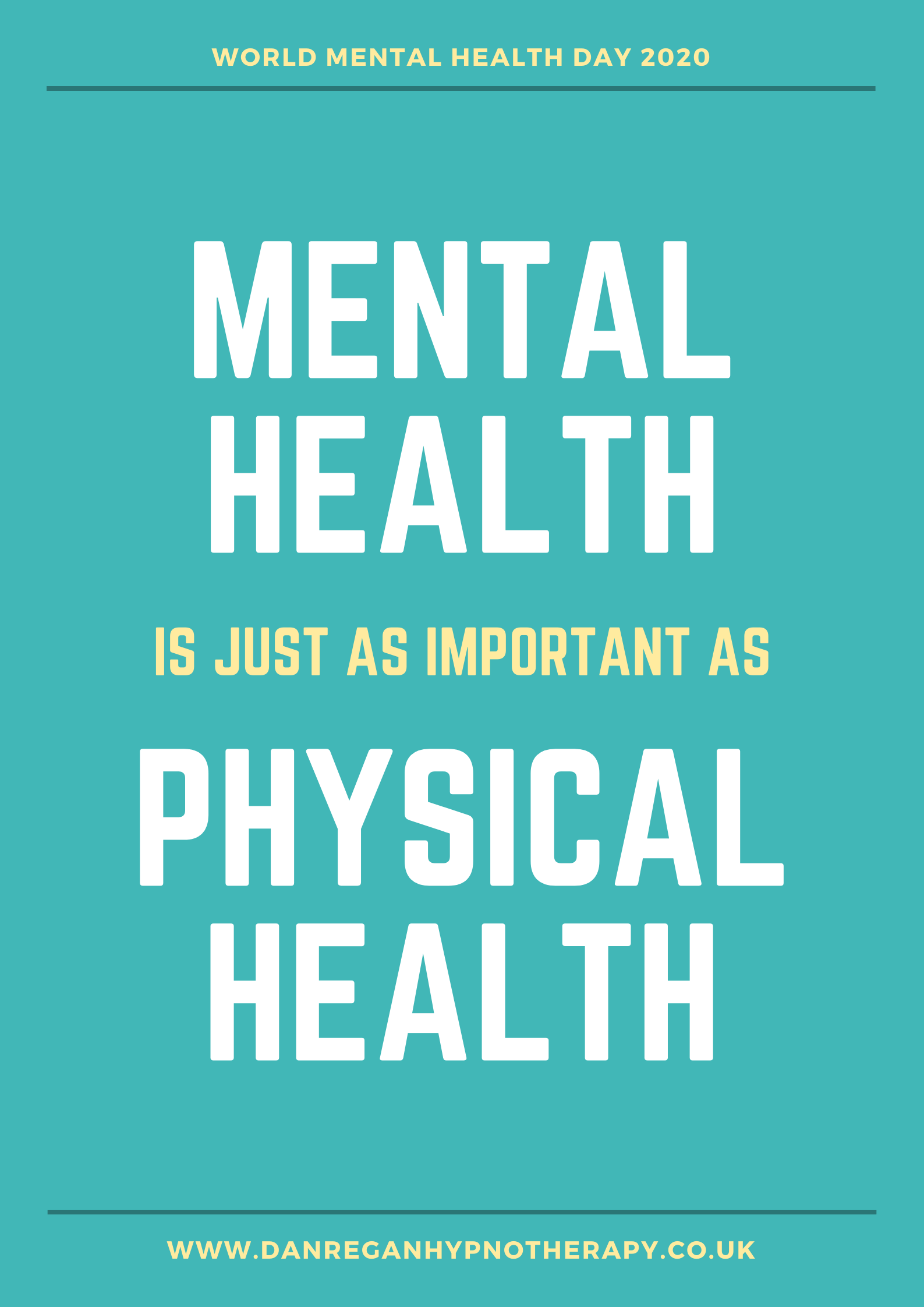World Mental Health Day – October 2020 – Coronavirus and Mental Health
This year, World Mental Health Day falls on 10th October 2020 and the theme for this year is ‘mental health for all.’
And, of course, mental health help and support should be as available as that which exists for physical health problems. As I’ve written about before, it’s great that there are so many mental health awareness initiatives these days. There should be no stigma around mental health issues and we all need to be aware of our own mental well-being, and that of those around us. If you have a mental health issue you should talk about it if you want to and we can all benefit from help and provide support and empathy to each other.
Yet whilst there is a plethora of mental health awareness campaigns, conversations, advocates and other sources raising awareness, they can only go so far. Most of these people and initiatives can only offer basic (if any) evidence based psychological support to help you overcome issues like anxiety and depression. After that, you are referred on and that’s where the need for mental health for all is really situated. Too many people can only chose between anti-depressants or a waiting list for treatment. Effective mental health services need to be more readily available, accessible and timely.
Of course, many people chose to work with a mental health expert like me to sort their issues, rather than continuing to suffer (and you can learn what many people have said by scrolling through my ‘What People Say‘ pages). Yet particularly in this ‘year of the coronavirus’ more is needed than just awareness and good intentions.
Coronavirus has led to many of you feeling anxious and worried. The uncertainty, restrictions and changes to our normal way of doing things can have a profound impact on your mental health and well-being. I wrote recently about the emergence of a definition for coronaphobia, the fear of contracting covid-19 and the implications of this for your health, livelihood and loved ones. Whether you have a predisposition to worry and anxiety, have a tendency to worry about physical symptoms (health anxiety) or your anxiety is more recent and related to the current times, your anxiety can have a huge impact on how you feel and on your life.
World Mental Health Day: Mental Health and Coronavirus
The current World Mental Health Day takes place against the backdrop of the coronavirus pandemic that has impacted in many ways upon us all.
In some recently published research, Google Trends was used to track population level mental health-related Google searches in the United States in the wake of the covid-19 pandemic (Google Trends can be used to look at the frequency with which people are using specific Google search terms). They identified pandemic associated spikes in searches related to anxiety symptoms and remote treatments for anxiety (Hoerger et al, Impact of the COVID-19 Pandemic on Mental Health: Real-Time Surveillance Using Google Trends, 2020).
They found that, following the pandemic declaration, there was a steep but temporary increase in Google searches related to worry, worry health and panic. They then suspect that the worry led to an increase in clinically relevant anxiety symptoms as there was a slightly later spike in anxiety related search terms (e.g. overwhelmed, anxiety symptoms, anxiety attack). They also noted that worry and anxiety related symptom searches have regressed recently which could be due to a reduction in anxiety symptoms or people having already carried out their online searches.
As might be expected, search behaviour suggested that people moved from searching for face to face therapy for their anxiety, towards online therapists. As I experienced with my hypnotherapy sessions, this may just reflect the social restrictions that came into force which meant help for anxiety and worry could only be carried out online.
“In sum, these analyses of Google Trends data suggest that Americans are already experiencing meaningful increases in anxiety symptoms and have a desire for the remote delivery of common anxiety treatment techniques.”
Mental Health and Coronavirus and Pets
In the research above it was noted that, whilst anxiety related searches increased, those for other mental health issues like depression and loneliness did not. They speculated that these issues may occur later, that people may be more resilient than anticipated or that reductions in stress issues in some areas of life may have offset some of the stress from coronavirus related issues (e.g. through reductions in office based stresses).
It’s also possible that some other factors have helped people to cope with mental health issues during the coronavirus pandemic.
For example, Ratschen et al (Human-animal relationships and interactions during the Covid-19 lockdown phase in the UK: Investigating links with mental health and loneliness, 2020) investigated the role that relationships and interactions between humans and animals play in the context of widespread social distancing and isolation measures.
The vast majority of companion animal owners stated that their animals constituted an important source of emotional support, with dogs, cats, horses and other companion farm animals scoring highest, although many also reported having being worried about their animals because of Covid-19 e.g. restricted access to veterinary care). Animal ownership was significantly associated with smaller decreases in mental health scores and smaller increases in loneliness scores during lockdown.
Results from this research suggest that companion animals constituted an important source of emotional support to owners in the Covid-19 lockdown and that companion animals have a role as potential social buffers for psychological distress and loneliness, regardless of species.
Thus some potential mental health implications of coronavirus may be mitigated by animal ownership, a finding that should come as no surprise if you read my article a long way back about the mental health benefits of having a pet (Mental Health & Pets – How Pets Can Benefit Your Mental Health). In that article I mention the research by Brooks et al (he power of support from companion animals for people living with mental health problems: a systematic review and narrative synthesis of the evidence, 2018) that pets provide benefits to those with mental health conditions through the intensity of connectivity with their owners and the contribution they make to emotional support in times of crises, together with their ability to help manage symptoms when they arise.
Coronavirus and Mental Health and Exercise
I’ve written more than enough in previous articles about the benefits of exercise for your mental health. Exercise can help you with depression and anxiety symptoms, and may serve a preventative role for your mental health too. If you want to know more about that then please head over to this article: Ely Festive 5k 2019 and Why You Should Get Running For Your Mental Health).
Duncan et al (2020) investigated the association between perceived change in physical activity or exercise and mental health outcomes over the short-term in response to COVID-19 mitigation strategies in a sample of adult twins. They concluded that “Strategies to mitigate the COVID-19 pandemic may be impacting physical activity and mental health, with those experiencing a decrease in physical activity also having higher levels of stress and anxiety.”
Thus a perceived decrease in physical activity or exercise was associated with increased perceived stress and anxiety levels. Overall the findings suggest that “physical distancing mitigation strategies in response to the COVID-19 pandemic may have an impact on individuals’ daily activities and mental health, specifically with slightly higher levels of stress and anxiety among those who experienced a decreased amount of physical activity“.
Decreasing your levels of exercise and activity may lead to an increase in your stress and anxiety levels (although coronavirus restrictions may have led to decreases due to new demands upon time etc).
Based upon this and previous research I’ve discussed, exercise of some form should really be a part of your personal mental health support programme (as I’ve covered before, running and bootcamp have certainly been a cornerstone of how I manage my own mental health).
I suspect that there is going to be plenty more research to come in the area of coronavirus and mental health. More and more studies will be able to look back at the impacts during lockdown and the mental health consequences since that time.
Whilst coronavirus measures may have impacted upon anxiety levels and mental health, the research suggestions pet ownership and the bond with your animal, along with exercise, can help. In addition, I know many people found some positives from the lockdown such as more family time, getting things done at home, learning a skill or pursuing a hobby.
There are plenty of other things that you can do to support your mental health and I covered several of the most simple (yet effective) things in a blog way back in March before lockdown was even a thing. This blog got kind of overlooked in the rapidly changing landscape we were thrown into around that time so have a read of it here: Do The Little Things In Life – How St David Can Help Your Mental Health.
If you are struggling with a mental health issue please do talk to someone rather than struggle on alone with your thoughts and feelings. We can all continue to raise awareness of mental health this World Mental Health Day but, even better, do take action to improve and support your good mental health.
To your health and happiness,
Dan Regan
Hypnotherapy in Ely & Newmarket
Struggling with anxiety, stress, worry and fear and need some help? Find out how I can help with a Complimentary Hypnotherapy Strategy Session. Learn more here: Appointments
Find out what dozens of other people have said after their hypnotherapy sessions with Dan: Hypnotherapy Testimonials
And check out these powerful hypnosis downloads that can start helping you right away with anxiety, confidence and more: Hypnosis Downloads
References:
Brooks, H.L., Rushton, K., Lovell, K., Bee, P., Walker, L., Grant, L. and Rogers, A., 2018. The power of support from companion animals for people living with mental health problems: a systematic review and narrative synthesis of the evidence. BMC psychiatry, 18(1), pp.1-12.
Duncan, G.E., Avery, A.R., Seto, E. and Tsang, S., 2020. Perceived change in physical activity levels and mental health during COVID-19: Findings among adult twin pairs. PloS one, 15(8), p.e0237695.
Hoerger, M., Alonzi, S., Perry, L.M., Voss, H.M., Easwar, S. and Gerhart, J.I., 2020. Impact of the COVID-19 pandemic on mental health: Real-time surveillance using Google Trends. Psychological Trauma: Theory, Research, Practice, and Policy, 12(6), p.567.
Ratschen, E., Shoesmith, E., Shabab, L., Silva, K., Kale, D., Toner, P., Reeve, C. and Mills, D.S., 2020. Human-animal relationships and interactions during the Covid-19 lockdown phase in the UK: investigating links with mental health and loneliness.






0 Comments